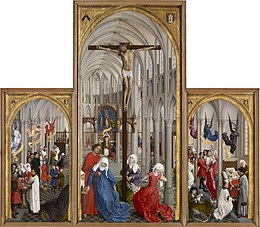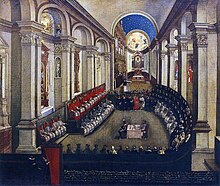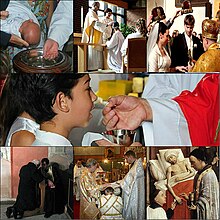
A | B | C | D | E | F | G | H | CH | I | J | K | L | M | N | O | P | Q | R | S | T | U | V | W | X | Y | Z | 0 | 1 | 2 | 3 | 4 | 5 | 6 | 7 | 8 | 9

| A series of articles on |
| Grace in Christianity |
|---|
|
|
| Part of a series on |
| Christianity |
|---|
 |
A sacrament is a Christian rite that is recognized as being particularly important and significant.[1] There are various views on the existence, number and meaning of such rites. Many Christians consider the sacraments to be a visible symbol of the reality of God, as well as a channel for God's grace. Many denominations, including the Roman Catholic, Lutheran, Presbyterian, Anglican, Methodist, and Reformed, hold to the definition of sacrament formulated by Augustine of Hippo: an outward sign of an inward grace, that has been instituted by Jesus Christ.[2][3][4][5] Sacraments signify God's grace in a way that is outwardly observable to the participant.[5]
The Catholic Church, Hussite Church and the Old Catholic Church recognise seven sacraments: Baptism, Penance (Reconciliation or Confession), Eucharist (or Holy Communion), Confirmation, Marriage (Matrimony), Holy Orders, and Anointing of the Sick (Extreme Unction).[6][7] The Eastern Churches, such as the Eastern Orthodox Church and Oriental Orthodox Church as well as the Eastern Catholic Churches, also believe that there are seven major sacraments, but apply the words sacred mysteries corresponding to Greek word, μυστήριον (mysterion), and also to rites that in the Western tradition are called sacramentals and to other realities, such as the Church itself.[8][9][10] Many Protestant denominations, such as those within the Reformed denomination of Calvinism, preach just two sacraments instituted by Christ, the Eucharist (or Holy Communion) and Baptism.[11] The Lutheran sacraments include these two, often adding Confession (and Absolution) as a third sacrament.[11][12] Anglican and Methodist teaching is that "there are two Sacraments ordained of Christ our Lord in the Gospel, that is to say, Baptism and the Supper of the Lord," and that "those five commonly called Sacraments, that is to say, Confirmation, Penance, Orders, Matrimony, and Extreme Unction, are not to be counted for Sacraments of the Gospel."[13][14]
Some traditions, such as The Religious Society of Friends do not observe any of the rites, or, in the case of Anabaptists, hold that they are simply reminders or commendable practices that do not impart actual grace—not sacraments but "ordinances" pertaining to certain aspects of the Christian faith.[15]
Etymology
The English word sacrament is derived indirectly from the Ecclesiastical Latin sacrāmentum, from the Latin sacrō ('hallow, consecrate'), itself derive from the Latin sacer ('sacred, holy'). In Ancient Rome, the term meant a soldier's oath of allegiance. Tertullian, a 3rd-century Christian writer, suggested that just as the soldier's oath was a sign of the beginning of a new life, so too was initiation into the Christian community through baptism and Eucharist.[16]
Summary table
| Denomination | Baptism | Confirmation | Holy Communion | Penance | Marriage | Holy Orders | Anointing of the Sick | Holy Leaven | Sign of the Cross |
|---|---|---|---|---|---|---|---|---|---|
| Catholic | |||||||||
| Eastern Orthodox | |||||||||
| Oriental Orthodox | |||||||||
| Church of the East | |||||||||
| Hussite | |||||||||
| Moravian | |||||||||
| Lutheran | Maybe | ||||||||
| Anglo-Catholicism[17] | |||||||||
| Anglican (broad church) | Maybe[note 1] | Maybe | Maybe | Maybe | Maybe | ||||
| Evangelical Anglicanism | |||||||||
| Methodism | |||||||||
| Reformed | |||||||||
| Irvingism | |||||||||
| Latter-Day Saints |
Catholicism

Roman Catholic theology enumerates seven sacraments:[18] Baptism, Confirmation (Chrismation), Eucharist (Communion), Penance (Reconciliation, Confession), Matrimony (Marriage), Holy Orders (ordination to the diaconate, priesthood, or episcopate) and Anointing of the Sick (before the Second Vatican Council generally called Extreme Unction). The list of seven sacraments already given by the Second Council of Lyon (1274) and the Council of Florence (1439)[19] was reaffirmed by the Council of Trent (1545–1563), which stated:
CANON I. – If any one saith, that the sacraments of the New Law were not all instituted by Jesus Christ, our Lord; or that they are more, or less, than seven, to wit, Baptism, Confirmation, the Eucharist, Penance, Extreme Unction, Order, and Matrimony; or even that any one of these seven is not truly and properly a sacrament; let him be anathema.
CANON IV. – If any one saith, that the sacraments of the New Law are not necessary unto salvation, but superfluous; and that, without them, or without the desire thereof, men obtain of God, through faith alone, the grace of justification; – though all (the sacraments) are not necessary for every individual; let him be anathema.[20]

During the Middle Ages, sacramental records were in Latin. Even after the Reformation, many ecclesiastical leaders continued using this practice into the 20th century. On occasion, Protestant ministers followed the same practice. Since W was not part of the Latin alphabet, scribes only used it when dealing with names or places. In addition, names were modified to fit a "Latin mold". For instance, the name Joseph would be rendered as Iosephus or Josephus.[21]
The Catholic Church indicates that the sacraments are necessary for salvation, though not every sacrament is necessary for every individual. The Church applies this teaching even to the sacrament of baptism, the gateway to the other sacraments. It states that "Baptism is necessary for salvation for those to whom the Gospel has been proclaimed and who have had the possibility of asking for this sacrament."[22][23] But it adds: "God has bound salvation to the sacrament of Baptism, but he himself is not bound by his sacraments,"[22] and accordingly, "since Christ died for the salvation of all, those can be saved without Baptism who die for the faith (Baptism of blood). Catechumens and all those who, even without knowing Christ and the Church, still (under the impulse of grace) sincerely seek God and strive to do his will can also be saved without Baptism (Baptism of desire). The Church in her liturgy entrusts children who die without Baptism to the mercy of God."[23]
In the teaching of the Roman Catholic Church, "the sacraments are efficacious signs of grace, instituted by Christ and entrusted to the Church, by which divine life is dispensed to us. The visible rites by which the sacraments are celebrated signify and make present the graces proper to each sacrament. They bear fruit in those who receive them with the required dispositions."[24]
While the sacraments in the Catholic Church are regarded as means of Divine Grace, The Catholic definition of a sacrament is an event in Christian life that is both spiritual and physical.[25] The seven Catholic sacraments have been separated into three groups. The first three Sacraments of Initiation are Baptism, Communion, and Confirmation. The two Healing Sacraments are Anointing of the Sick and Penance. The two Sacraments of Vocation are Matrimony and Holy Orders.
The Church teaches that the effect of the sacraments comes ex opere operato, by the very fact of being administered, regardless of the personal holiness of the minister administering it.[26] However, as indicated in this definition of the sacraments given by the Catechism of the Catholic Church, a recipient's own lack of proper disposition to receive the grace conveyed can block a sacrament's effectiveness in that person. The sacraments presuppose faith and, through their words and ritual elements, nourish, strengthen and give expression to faith.[27]
Though not every individual has to receive every sacrament, the Church affirms that for believers the sacraments are necessary for salvation. Through each of them, Christ bestows that sacrament's particular healing and transforming grace of the Holy Spirit, making them participants in the divine nature through union with Christ.[28]
Eastern Orthodoxy and Oriental Orthodoxy
| Part of a series on the |
| Eastern Orthodox Church |
|---|
| Overview |
